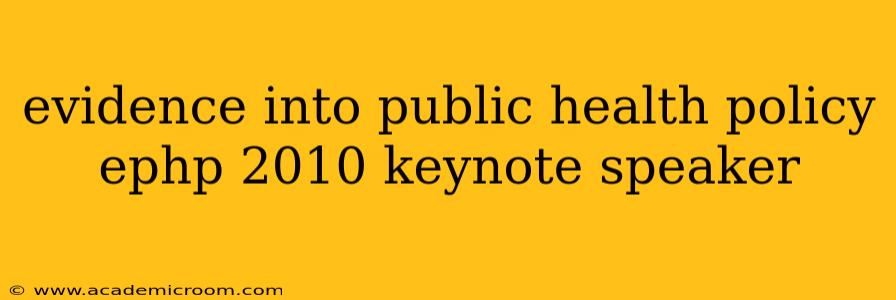Integrating Evidence into Public Health Policy: Reflections on the EPHP 2010 Keynote
The 2010 Evidence into Public Health Policy (EPHP) conference undoubtedly left a lasting impact on the field, pushing forward crucial conversations about utilizing research to inform effective public health strategies. While I don't have access to the specific keynote address from that year, I can discuss the general themes and challenges surrounding evidence integration in public health policy, which were likely central to the keynote presentation. This analysis will also explore some of the key questions surrounding this critical topic.
What are the key challenges in translating evidence into public health policy?
Translating research findings into impactful policy changes is a complex process fraught with numerous obstacles. One primary challenge lies in the gap between the research community and policymakers. Researchers often communicate their findings in highly technical language, while policymakers require concise, policy-relevant summaries that address specific needs and priorities. This communication breakdown hinders effective knowledge translation.
Another significant hurdle is the political context surrounding policy decisions. Public health interventions often face opposition from vested interests or ideological disagreements. Even robust evidence may not be sufficient to overcome entrenched political positions. Funding limitations, competing policy priorities, and the pressure of immediate political needs can also overshadow the long-term benefits of evidence-based public health interventions.
Finally, the complexity of public health issues themselves poses a challenge. Many problems are multifaceted, involving social, economic, and environmental determinants, making it difficult to isolate the impact of a single intervention and accurately measure its effectiveness. The need for strong longitudinal studies and diverse methodologies to understand complex systems can often be overlooked in the rush for quick policy solutions.
How can we improve the use of evidence in public health decision-making?
Overcoming these challenges requires a multi-pronged approach. Firstly, strengthening communication channels between researchers and policymakers is crucial. This involves developing clear and concise communication strategies that bridge the language gap and present findings in a policy-relevant manner. Training opportunities for both researchers and policymakers on effective communication and knowledge translation are essential.
Secondly, fostering collaborative partnerships between researchers, policymakers, and community stakeholders is vital. Engaging communities in the research process and policy development ensures that interventions are tailored to local contexts and address real-world needs. Collaborative approaches ensure buy-in from all stakeholders and increase the likelihood of policy implementation and sustainability.
Finally, we need to improve the quality and accessibility of evidence. This means investing in robust research methodologies that address the complexity of public health problems, ensuring that findings are easily accessible to policymakers and the public, and promoting open access to research data. This increased transparency allows for better scrutiny of the evidence base and strengthens public trust.
What are some examples of successful evidence-based public health policies?
Numerous examples demonstrate the positive impact of evidence-based public health policies. The success of tobacco control measures, such as increased taxation and public awareness campaigns, highlights the power of combining evidence with effective policy interventions. Similarly, advancements in infectious disease control, driven by epidemiological research and targeted vaccination programs, have dramatically reduced the burden of many preventable diseases. These successes demonstrate the crucial role evidence plays in shaping effective and impactful public health policy.
What role do ethical considerations play in using evidence in public health policy?
Ethical considerations are paramount in evidence-based public health policy. Ensuring that policies are equitable, respectful of human rights, and do not disproportionately impact vulnerable populations is vital. Careful consideration should be given to potential unintended consequences and the need for ongoing monitoring and evaluation to ensure that policies remain ethically sound and achieve their intended outcomes. Transparency and public engagement are also essential for fostering trust and ensuring that policies are developed in a participatory and ethically responsible manner.
In conclusion, while the specific content of the 2010 EPHP keynote address is unavailable, this discussion explores the key themes and challenges surrounding evidence integration in public health policy. Addressing these challenges requires a collaborative, transparent, and ethically grounded approach that prioritizes effective communication, stakeholder engagement, and high-quality evidence. Only then can we truly leverage the power of research to improve public health outcomes.
